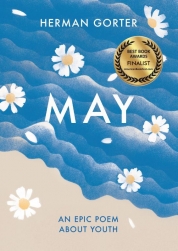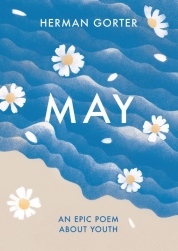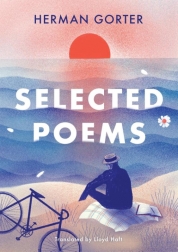About us
Arimei Books
Edelkarper 25
2318NJ Leiden
www.arimeibooks.com
De webshopverkopen worden uitgevoerd door:
Vrije Boeken
Kleine Koppel 44
3812 PH Amersfoort
tel. 033-2022080
info@vrijeboeken.com
 € 24,50
€ 24,50
Herman Gorter's masterpiece, in a translation that celebrates youth's sweet melancholy. Special bilingual and annotated edition, with a foreword by Lloyd Haft. Volume 1 of 'The Essential Gorter'.'May' is Volume 1 of 'The Essential Gorter'. The classic original Dutch text 'Mei' is included in this special edition. 'May' describes the magical journey of adolescence against the background of Holland’s flowery dunescapes. In strokes of wonder-filled impressions a stunningly unspoiled girl, May, explores the promise of springtime and the intense spiritual life of youth. However, the cycle of life always moves on, and as May matures and returns to earth, she finds it readying for summer. When Herman Gorter published 'May' (Dutch: Mei) in 1889, this spontaneous and vibrant epic poem was immediately recognized by his peers as a landmark of Dutch literature. 'May' was perhaps an inevitable product of the artistically revolutionary and highly lucid spirit in The Netherlands of the 1880s. While Gorter’s contemporary, Vincent Van Gogh, had just completed the groundbreaking 'Sunflowers' series of paintings, Gorter succeeded with 'May' in composing his own artistic monument of colourful and innovative power. 'The reader is drawn almost breathlessly onward through magnificent word-groups ... full of surprising turns of phrase ... Before you know it, you'll be reading it out loud!' - Lloyd Haft, poet 'Closer to Gorter is near impossible' - Jan de Jong for Tzum. 'A must-read for anyone with an interest in language and poetry...' - Dr. Jacqueline Bel, Professor of Literature, VU Amsterdam, CAANS Magazine. 'This thoughtful, lyrical translation will stir the imagination and invite consideration of what makes the heart sing, even if the joy, like May, is only temporary. The poem, though, will endure.' - Editor's Pick, Booklife Translated by M. Kruijff. Bilingual and annotated edition.Tzum.nlRecensie door Jan de Jong...Dichter bij Gorter zal geen Engelstalige lezer ooit komen. Zowel in Verzen, als in Mei, Pan of in enig ander werk was Herman Gorter allereerst een stemmingsdichter, iemand die bij uitstek zijn lezers op een golf van gevoel kon meevoeren. Dát is de kern van zijn werk. En de twee delen van The Essential Gorter juist daarin meesterlijk geslaagd.
 € 14,99
€ 14,99
Gorter's masterpiece May is a landmark of Dutch literature. This thoughtful, lyrical translation will invite consideration of what makes the heart sing, even if the joy, like May, is only temporary.May describes the magical journey of adolescence against the background of Holland’s flowery dunescapes. In brush strokes of wonder-filled impressions a stunningly unspoiled girl, May, explores the promise of springtime and the intense spiritual life of youth. However, the cycle of life always moves on, and as May matures and returns to earth, she finds it readying for summer. When Herman Gorter published May (Mei) in 1889, this spontaneous and vibrant epic poem was immediately recognized by his peers as a landmark of Dutch literature. Inspired in part by John Keats' Endymion (1818), May was perhaps an inevitable product of the artistically revolutionary and highly lucid spirit in The Netherlands of the 1880s. While Gorter’s contemporary, Vincent van Gogh, had just completed the groundbreaking Sunflowers series of paintings, Gorter succeeded with May in composing his own monument of colourful and innovative power. 'A gripping story... breathlessly onward through magnificent word groups... full of surprising turns of phrase... before you know it, you'll be reading it out loud!' - Lloyd Haft, poet 'This thoughtful, lyrical translation will stir the imagination and invite consideration of what makes the heart sing, even if the joy, like May, is only temporary. The poem, though, will endure.' - Editor's Pick, BookLife
 € 14,99
€ 14,99
The most extensive selection in English of poems by one of the all-time great Dutch poets, Herman Gorter (1864-1927), incl. selection from the sensitivist Verses, the socially engaged Pan and Lyrics.This is the most extensive selection in English of poems by one of the all- time great Dutch poets, Herman Gorter (1864-1927). A companion volume to M. Kruijff’s translation of the epic May, this book welcomes the reader to the rich spectrum of Gorter’s lyric verse. The selection traces the stages of Gorter’s career as a poet. It opens with 22 poems from his introvertive ‘sensitivist’ Verses (Verzen, 1890) which have been called the beginning of modern Dutch poetry. These are followed by poems from later collections in which Gorter was transitioning to a less self- and more world-focused perspective. In the subsequent passages from the long epic Pan (1912/1916), he has clearly become a ‘socialist’ poet, albeit in a unique visionary sense. He is now pursuing a theme which will obsess him for the rest of his life: how to address the object of his love as both an individual woman and an incarnate summation of all humanity. The rest of the book comprises the first publication in English of Gorter’s little-known last work Lyrics (Liedjes,1930). Haft’s judicious abridgment preserves the structure, erotic themes, and lyric high points of this outstanding sequence which originally occupied three volumes. Translator Lloyd Haft (1946) grew up in the USA and graduated from Harvard. Graduate studies in Chinese took him to Leiden, and he has lived in The Netherlands since 1968. He soon discovered a fascination with modern Dutch poetry, starting with Herman Gorter’s famous (or notorious) Verses. He became a regular translator for Poetry International and published ten volumes of his own poetry in Dutch, including a free-verse adaptation of the Psalms which won the 2004 Ida Gerhardt Prize. Professionally, for many years Lloyd Haft taught Chinese language and literature at Leiden University. Since retirement he has spent much of his time in Taiwan with his wife Katie Su, a writer on theater arts in Taiwan. His collected translations from the metaphysical poet Zhou Mengdie are scheduled for publication in 2021.
